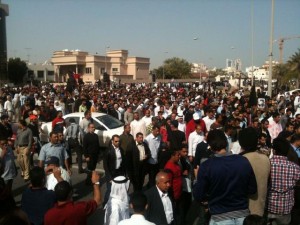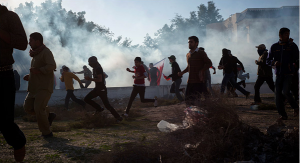Protests against Bahrain’s government escalated today as a second demonstrator was killed and in Yemen anti-government marchers clashed with police as unrest spreads through the Middle East.
Thousands of Bahrainis joined a procession near the capital, Manama, carrying the coffin of Ali Abdul Hadi Mushaima in the biggest demonstration so far in the Persian Gulf kingdom. Mushaima was killed during clashes yesterday with police, who fired bird-shot and rubber bullets and used tear gas. A second protester died today in fighting at the funeral, the official Bahrain News Agency said. The Shiite Muslim Al-Wefaq group suspended participation in parliament to protest the violence.
In Yemen, stone-throwing protesters clashed with police as they marched toward the presidential palace, the fifth day of demonstrations calling for an end to President Ali Abdullah Saleh’s rule. Iranian security forces yesterday used tear gas to break up the biggest anti-government protests since the aftermath of the disputed presidential election in June 2009.
Popular demands for democracy and civil rights, invigorated by the mass protests that toppled Egypt’s Hosni Mubarak last week, are rattling the autocratic rulers of a region that holds about three-fifths of the world’s oil reserves. Brent crude futures rose for a second day after closing yesterday at the highest level since September 2008.
Gulf Regimes
The protests in Bahrain, home to the U.S. Navy’s Fifth Fleet, and Iran mark the spread of unrest into the Persian Gulf, the area where most Middle Eastern oil is produced. Many Gulf states including Saudi Arabia and the United Arab Emirates are U.S. allies. All of the region’s governments are classified as autocratic regimes in the Economist Intelligence Unit’s 2010 Democracy Index.
Shiites who represent as much as 70 percent of Bahrain’s population say they face job and housing discrimination. King Hamad bin Isa al-Khalifa, a Sunni Muslim, has ordered an increase in food subsidies and social welfare payments, and a grant of 1,000 dinars ($2,653) to each Bahraini family.
Mushaima’s funeral cortege was carrying the coffin, draped with Shiite flags, to the dead man’s village as demonstrators shouted “Down with Khalifa.” They were referring to Prime Minister Sheikh Khalifa bin Salman al-Khalifa, who has held the premiership for four decades.
“Clearly events are spiraling downwards as violence mounts,” said Theodore Karasik, director of research at the Dubai-based Institute for Near East and Gulf Military Analysis. “ More people may be killed and this will likely bring more protesters onto to the streets. If pressure mounts too much and the Kingdom is in danger, there may be outside intervention.”
‘Sanctioned by Law’
Foreign Minister Khalid bin Ahmed bin Mohammed al-Khalifa said in an interview yesterday that protests are “sanctioned by the law” in Bahrain and won’t have the same effect as the popular movements in Egypt and Tunisia.
Bahrain’s dollar bonds due in 2020 fell, sending yields up 6 basis points to 6.21 percent, the highest level since the debt was issued in March, according to data compiled by Bloomberg. The cost of insuring Bahrain’s bonds against default jumped 10 basis points to 253, the highest in a week, according to CMA prices for credit-default swaps.
Brent crude for April settlement climbed as much as 96 cents, or 0.9 percent, to $104.04 a barrel in London.
“Fear that civil unrest could spread into oil-producing states in the Middle East is keeping investors nervous,” said Andrey Kryuchenkov, an analyst with VTB Capital in London.
Iran Output
Iran is the second-largest producer in the Organization of Petroleum-Exporting Countries, producing about 3.7 million barrels a day, according to Bloomberg data. Bahrain pumped about 32,000 barrels a day of crude in 2009 and 1.49 billion cubic feet of gas, according to the national oil and gas authority.
Bahrain experienced clashes between Shiites and police before parliamentary elections in October. The royal family has close ties with Sunni-ruled Saudi Arabia, the largest Arab economy. Many among Bahrain’s populace retain cultural and family links with Shiite-dominated Iran, Saudi Arabia’s main regional rival.
Al-Wefaq won 18 of 40 parliament seats in an October election. The assembly can only pass laws with the consent of an upper chamber whose members are chosen by the king.
The group will suspend its parliamentary role until the protesters’ demands are met, senior lawmaker Abduljalil Khalil, said in an interview today. “No one will accept cosmetic changes,” he said, adding that al-Wefaq’s demands aren’t influenced by Iran.
Protesters in Yemen are demanding that Saleh quit after 32 years in power. The president said on Feb. 2 that he won’t seek to extend his term when it expires in 2013 and that his son wouldn’t succeed him as president. At least 17 people were injured and 165 detained in the capital, Sanaa, Xinhua news agency reported yesterday, citing witnesses.
$2 a Day
Unlike Bahrain, the Yemen government — which is struggling to quell separatist movements and halt al-Qaeda operations based in the country — can’t afford to try to buy calm by offering economic benefits. Yemen faces serious water shortages, declining oil output and a society where more than half the population of 23 million is under 20 years old. About 40 percent of Yemen’s population lives on less than $2 a day.
Petroleum production and refining account for 60 percent of Bahrain’s export receipts, 70 percent of government revenue and 11 percent of gross domestic product, which was about $22 billion last year, according to the CIA World Factbook.
Iran’s opposition movement says it has drawn inspiration from the Arab revolts that removed Mubarak and Tunisia’s Zine El Abidine Ben Ali. It accuses Supreme Leader Ali Khamenei and President Mahmoud Ahmadinejad of meeting popular demands for change with violent repression.
Tear Gas, Batons
Yesterday’s demonstration in Tehran was backed by opposition leaders including Mir Hossein Mousavi and Mehdi Karrubi who challenged Ahmadinejad in the 2009 election and said the result was rigged. Tens of thousands of protesters were dispersed by security forces using tear gas and baton charges, al-Jazeera television said. Iranian officials said one person, a government supporter, was killed, the Associated Press reported.
In Egypt, the army took control after Mubarak’s resignation on Feb. 11 and has pledged to oversee a rewriting of the constitution to prepare the ground for free elections. Tunisia is also preparing for elections under an interim government after Ben Ali’s Jan. 14 ouster, and opposition groups including the main Islamist movement are competing with representatives of the former ruling party to steer the transition.
-With assistance from Claudia Maedler and Inal Ersan in Dubai, Terry Atlas in Washington, Robert Tuttle in Qatar, Ben Sharples in Melbourne and Abigail Moses, Grant Smith and Stephen Kirkland in London. Editors: Ben Holland, Louis Meixler.




















